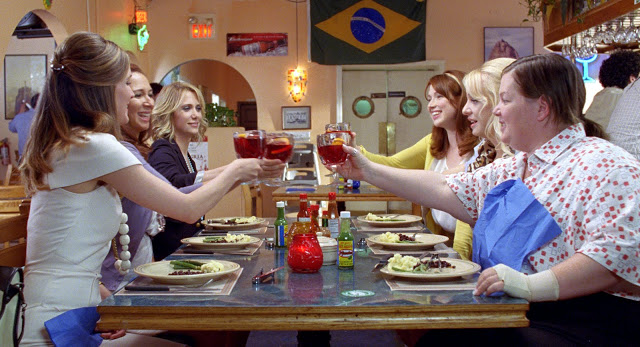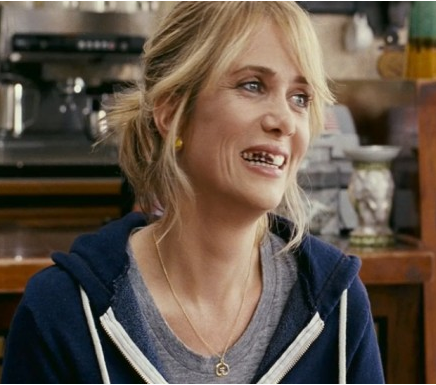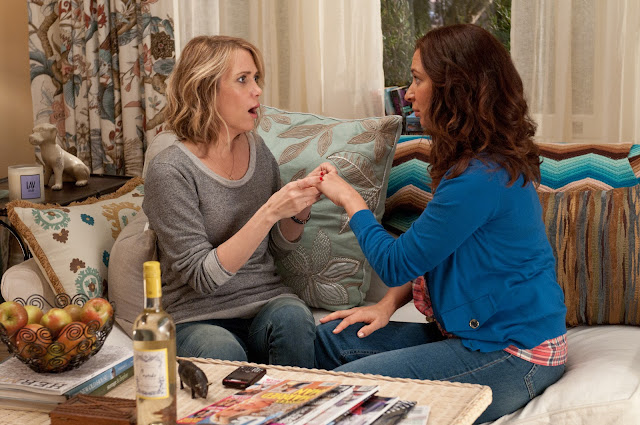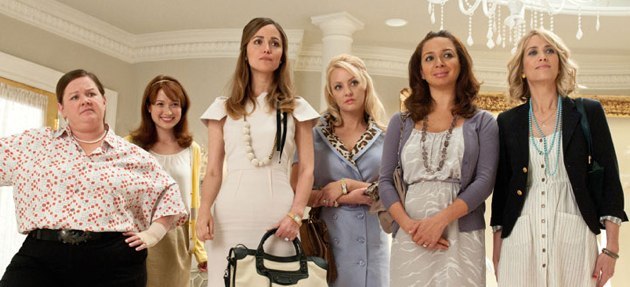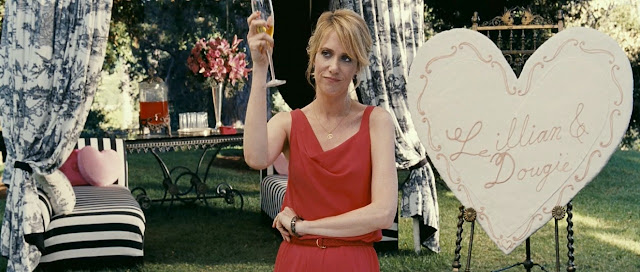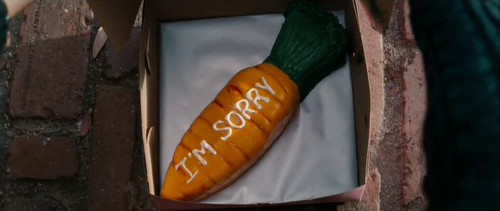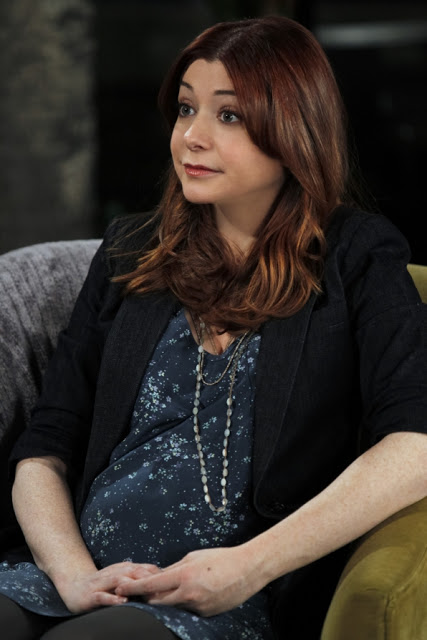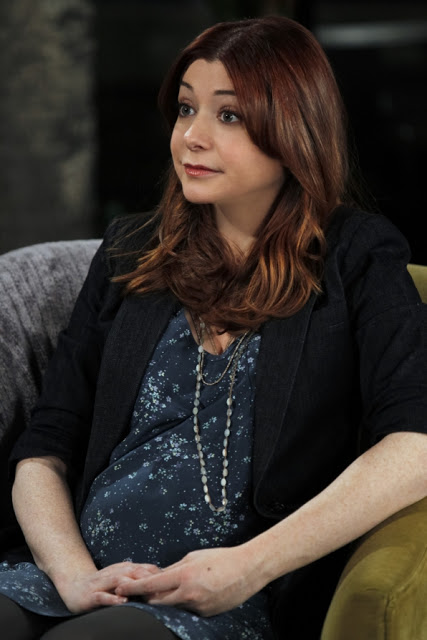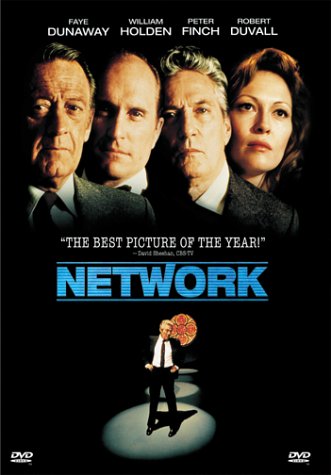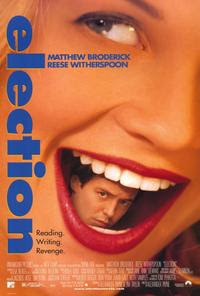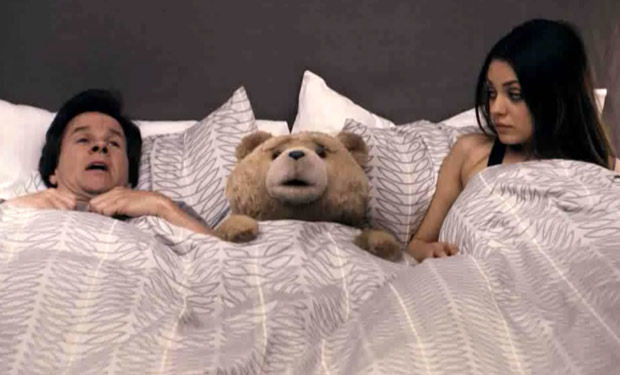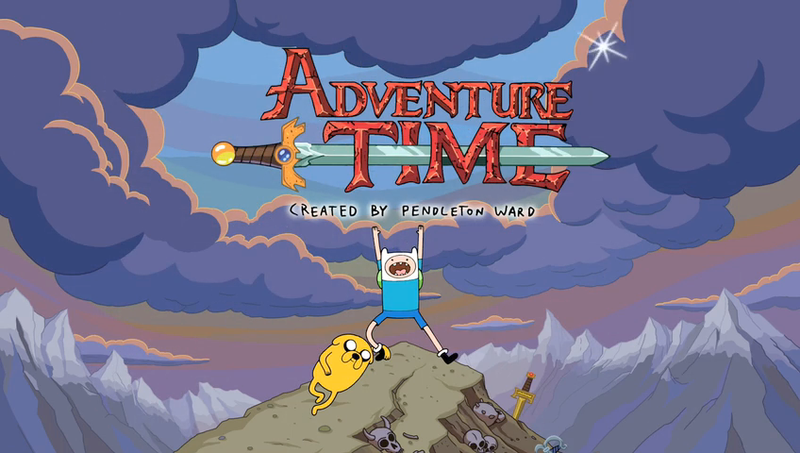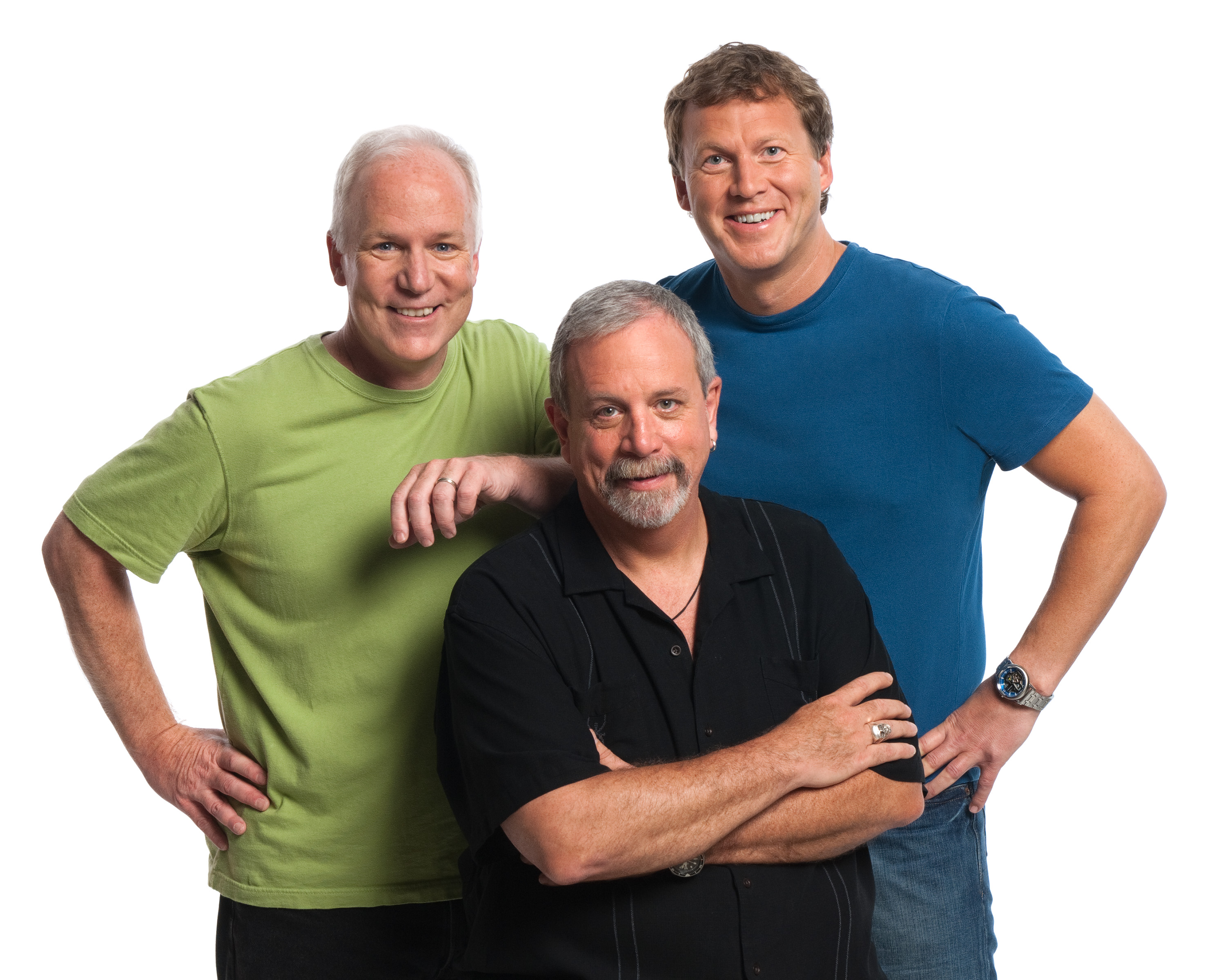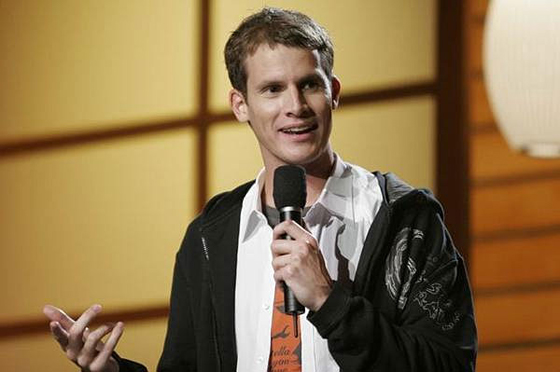| Bridesmaids |
Tag: Comedy
"Pregnancy Brain" in Sitcoms
 |
| Alyson Hannigan as Lily Aldrin in “How I Met Your Mother” |
 |
| Fortunately, Lily has a man by her side! (Hannigan and Jason Segel) |
 |
| Sofia Vergara as Gloria Delgado-Pritchett on “Modern Family” |
 |
| More similar than you might think (Vergara and Julie Bowen) |
"Pregnancy Brain" in Sitcoms
 |
| Alyson Hannigan as Lily Aldrin in “How I Met Your Mother” |
 |
| Fortunately, Lily has a man by her side! (Hannigan and Jason Segel) |
 |
| Sofia Vergara as Gloria Delgado-Pritchett on “Modern Family” |
 |
| More similar than you might think (Vergara and Julie Bowen) |
Indifferent To Suffering, Insensitive To Joy: ‘Network’s’ Dangerous Career Woman
 |
| Network DVD Art |
 |
| Diana Christensen |
 |
| Howard Beale’s Rant |
 |
| Diana celebrating The Howard Beale Show’s success |
Myrna Waldron is a feminist writer/blogger with a particular emphasis on all things nerdy. She lives in Toronto and has studied English and Film at York University. Myrna has a particular interest in the animation medium, having written extensively on American, Canadian and Japanese animation. She also has a passion for Sci-Fi & Fantasy literature, pop culture literature such as cartoons/comics, and the gaming subculture. She maintains a personal collection of blog posts, rants, essays and musings at The Soapboxing Geek, and tweets with reckless pottymouthed abandon at @SoapboxingGeek.
Women in Politics Week: ‘Election’: Female Power and the Failure of Desperate Masculinity
“I just think people are made uncomfortable by ambitious women.”
– Tom Perrotta, author of Election, the book that inspired the film
 |
| Tracy Flick (Reese Witherspoon) running for Student Government President |
 |
| Jim McAllister (Matthew Broderick), Teacher of the Year |
 |
| Flick knows the answers, although McAllister doesn’t want to hear them |
 |
| McAllister falls apart |
“What I was responding to with Tracy was new: a generation of hard-charging women, the daughters of first-generation feminists and unapologetic achievers. This was the late 80s and early 90s, and they were different than the girls I had grown up with, more willing to compete. The only other cultural reference points for women like that then were movie stars and entertainers. People like Madonna. Who was it going to be in politics? Golda? Indira? Thatcher? By default, there are few female political touchstones.”
 |
| Face of determination |
—
Leigh Kolb is a composition, literature and journalism instructor at a community college in rural Missouri.
Damning ‘Ted’ with Faint Praise
 |
| Mark Wahlberg and Mila Kunis in Ted. |
Why I Love ‘Adventure Time’
 |
| Title Screen for Adventure Time |
Adventure Time is a Cartoon Network animated series that combines surrealistic comedy, fantasy and science-fiction. Based on a 2008 short by Pendleton Ward that went viral, it parodies the tropes, archetypes and cliches of fairy tales, video games and childhood action figure battles. The basic premise is about Finn, the last remaining human, and his best friend/adoptive brother Jake (a shape-shifting dog), going on your typical slay-the-monster-save-the-princess adventures. Now in its fourth season, it’s an enormous hit with all genders and age groups and shows no signs of slowing down. And let me tell you, as a feminist, why I am absolutely celebrating this show.

 |
| The main cast of Adventure Time |
- Almost every female character is a princess, but the typical cliche Damsel In Distress and/or romance-obsessed girly-girl are parodied and subverted for all they’re worth. In several instances, the princess characters (Bubblegum especially) show little interest in romance, and far more interest in their own personal hobbies. Even more encouraging is that often the female characters are completely able to rescue themselves, and don’t need Finn & Jake’s help.
- The characters are given genuine honest-to-goodness flaws. Finn is heroic, but has a terrible bad temper and an impulsive streak. Jake is easygoing, but not nearly as clever or level-headed as he thinks he is. Princess Bubblegum is a scientific genius, but can be incredibly callous about the feelings of others. Marceline is a talented musician, but also has deep insecurities about how her friends perceive her. Flame Princess is astoundingly powerful, but also has dangerously passionate emotions. In all of these cases, there’s no black and white morality. It’s an important lesson for children (since this is a children’s show) to present morality as it really is – in shades of grey.
- I love all the female characters, including the gender flipped versions of Finn and Jake, Fionna and Cake. My main complaint with the series is that the female characters don’t appear nearly often enough, and especially not together. We eventually do get some Bechdel Test passing goodness (Bubblegum and Marceline don’t get along too well – and people have naturally interpreted this as sexual tension) but so far the three main female characters have not yet all appeared in the same story together. I suspect that the main reason for this is because each story is about 11-12 minutes in total, and there’s only so much time for introducing characters and conflicts.
 |
| Jake stretching around the other main cast members |
- Speaking of Fionna and Cake, I can see now why that episode is so astoundingly popular amongst the fandom. It’s easily my favourite one of the series. Fionna is an absolutely adorable character – slightly chubby instead of unrealistically slender, tomboyish instead of traditionally feminine, and she still retains her male counterpart’s bravery and heroicism. She still fights with a sword. For my fellow gamers, think of all the games you’ve played in which a female character is a sword fighter. Not very many, right? But there’s no reason they can’t, and this is one thing I really love about the gender flip episode. I also practically exploded with joy at the final scene where Fionna talks about how she has lots of guy friends, but isn’t interested in/isn’t ready to date them, and that there’s nothing wrong with that. THANK YOU. It’s incredibly frustrating how many people think that somehow something is missing if you don’t have an official romantic partner, or that men and women can’t have a platonic friendship. Shippers could do well to remember this – you can like someone without wanting to bang them. (Also, as a Sailor Moon fan, you can’t imagine my joy at seeing Fionna’s ballgown homage to Princess Serenity’s outfit) At any rate, I hope the Gender Swap episodes happen on a regular basis, rather than a once-a-season deal. Wouldn’t it be nice if we had more shows about an ass-kicking girl and her feline best friend? (*coughcoughSailorMooncoughcough*)
- This is a fairly obvious point, but I really love how Princess Bubblegum’s interest in science is depicted. She’s an absolute genius – shattering the still pervasive stereotype that the sciences are the domain of men – and she also bucks the stereotype that nerdy/geeky people are unable to have fun or to relate to others. Similarly, Marceline’s interest in punk/indie rock also combats the stereotype that rock is a genre made by and for the enjoyment of men. Girls like to headbang too!
- The Christmas special, which reveals that pseudo-antagonist Ice King was actually a human antique dealer driven insane by his find of a magic crown, is an interesting way of approaching and explaining his very archetypal tendency to kidnap and try to marry princesses. In the Ice King’s case, it’s not so much a wanting to stick to traditional fairy tale gender roles, but a manifestation of his grief over losing the fiance he used to nickname “Princess.” The Ice King is primarily a comic character, but this episode finally established him as being tragic.
 |
| Fionna and Cake |
- I appreciated that, for once, romantic tensions are resolved rather than dragged on, and on, and on, and on. They make it clear that while Princess Bubblegum likes Finn as a person, she feels she’s too old for him, and her sometimes callous treatment of his feelings proves that she isn’t the right partner for him. Flame Princess isn’t the perfect girlfriend either, but at least in their case, Finn and Flame got together very quickly, changing the romantic plotline from “Will they or won’t they?” to “What happens now they’ve got together?” I also like that Jake and Lady Rainicorn’s relationship is loving, positive, literally interracial, and well…adult. (Lady Rainicorn’s dialogue is only in Korean, and bilingual viewers have revealed she says some incredibly raunchy things that only Jake can understand)
- In the “Memory of a Memory” episode, Marceline’s (ex) boyfriend tries to bully her into traditional gender roles. He even pulls the “Go back in the kitchen and make me a sandwich” bit. She finds out he tried to trick her, and kicks his ass. (Also, dear men who think this joke is funny: Wow. You’re original. YES I AM GOING TO GO IN THE KITCHEN AND I’M GOING TO MAKE LOTS OF DELICIOUS FOOD WHICH YOU CAN’T HAVE.)
- In some ways, other than Marceline, Lumpy Space Princess is my favourite character. She is absolutely hilarious as a sassy valley girl type who, by most accounts, should not be as confident about her body and her sexiness as she “should” be. After all, she’s literally a purple ball of lumps. But this is an important message – you DON’T have to match cultural standards of beauty to be sexy. It’s all about confidence. I’m a fatass, and I’m friggin’ sexy if I do say so myself. And in her own way, LSP is sexy too. At least to fellow Space Lumps.
 |
| Finn |
- The show just keeps getting better every season. The quality of animation has spiked, the character arcs are realistic and well-defined, and the storylines are mature without losing their comedic edge. I’m absolutely hooked on this series, and it’s a refreshing feeling that this year, along with Gravity Falls, I got to watch some great new children’s shows that deserve every bit of praise they receive.
- Lastly, I love the sense of humour in the show. I’ve always been a fan of surrealism, as well as referential humour. And I’m also a big fan of fart jokes, like the one where Jake morphs himself into a farting cheetah. I’m 25 years old, and fart jokes are still funny.
Myrna Waldron is a feminist writer/blogger with a particular emphasis on all things nerdy. She lives in Toronto and has studied English and Film at York University. Myrna has a particular interest in the animation medium, having written extensively on American, Canadian and Japanese animation. She also has a passion for Sci-Fi & Fantasy literature, pop culture literature such as cartoons/comics, and the gaming subculture. She maintains a personal collection of blog posts, rants, essays and musings at The Soapboxing Geek, and tweets with reckless pottymouthed abandon at @SoapboxingGeek.
Summer Blockbusters Prove Women (Not Surprisingly) Enjoy Laughing and Gawking from Their Own Perspective
The Significance of Bridesmaids and Magic Mike in a Sea of Masculinity
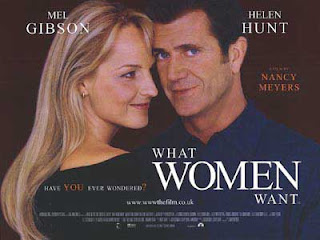 |
| Not this. |
While one can easily find wider representation in art house movie theaters, commercial, blockbuster films for the masses have long been entrenched in a sexist Hollywood boys’ club. While these commercial films had flaws, the audience support and huge profits should teach Hollywood a lesson about what women want.
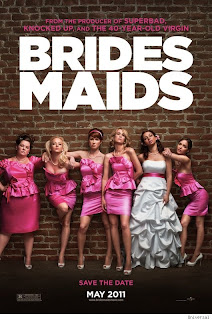 |
| Bridesmaids featured a female protagonist and told a uniquely female story, while still attracting and entertaining male audiences. |
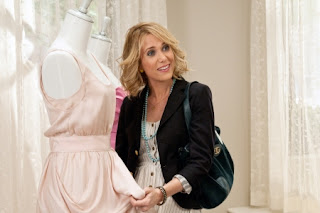 |
| Kristen Wiig co-wrote the film. |
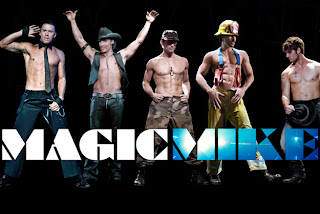 |
| Magic Mike proved the female gaze is alive and well. |
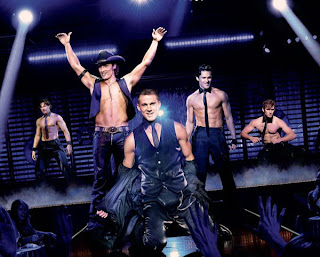 |
| Many audience members were disappointed that there wasn’t more stripping. |
Movie Riffing: A White Man’s World
 |
| RiffTrax: funny white men. |
 |
| MST3K / Cinematic Titanic: mostly funny white men. |
 |
| OH MY GOD GIVE HER A SHOW ALREADY |
Bitch Flicks’ Weekly Picks
Stephanie‘s Picks:
Comic-Con 2012: Sexism in Hollywood: How Far Have We Come? by Lucas Shaw via The Wrap
Will Catwoman Be a Breakout Feminist Character? by Melissa Silverstein via Women and Hollywood
“Nice Guys” Contribute to Rape Culture by Ben Atherton-Zeman via Ms. Magazine
Women in Film by the Numbers via Reel Grrls (from Pinterest)
From ‘The Lion King’ to ‘Brave,’ Making Mothers Matter in Pop Culture by Alyssa Rosenberg via ThinkProgress
Bear, Bow, And Boy: Queering Pixar’s “Brave” by Rainicorn via Gay Christian Geek
Megan‘s Picks:
If Women Ran Hollywood by Martha Lauzen via Women’s Media Center
All the Funny Ladies: What the Emmy Nominations Tell Us About a Year of Women in Comedy by Alyssa Rosenberg via Slate’s XX Factor
Considering the Rape Culture by Melissa McEwan via Shakesville
‘Political Animals’ and Women’s Power Fantasies by Alyssa Rosenberg via ThinkProgress
Louis C.K. on Daniel Tosh’s Rape Joke: Are Comedy and Feminism Enemies? by Jennifer L. Pozner via The Daily Beast
Filmmakers Find Surprises at an Islamic School for Girls in Syria by Amy DePaul via Women’s Media Center
A New Sleeping Beauty Adaptation Will Feature a Stalker Take on the Classic Tale by Alanna Bennett via The Mary Sue
‘Brave’ Part II: The Radical Re-Writing of the Mother-Daughter Relationship by Didion via Feminema
The Savior and the Vandal: Jerusalem Film Festival and Religious Fundamentalism: [the vandalism of women’s images] by Kyna Morgan via Her Film
Dear, Aaron Sorkin: Someone Please Fix You by Sasha Stone via Women and Hollywood
What have you been reading this week? Tell us in the comments!
Daniel Tosh and Rape Culture: The Roundup
 |
| Daniel Tosh |
Serious Trigger Warning for discussions of rape, rape culture, and sexual assault.
———-
Last Thursday, Megan wrote a piece about the recent Daniel Tosh clusterfuck–“Dear Daniel Tosh: You Know What’s Even Less Funny Than Rape Jokes? Rape Threats“–in which she discusses “his misogynistic douchebaggery as he verbally attacked a female audience member.”
She writes:
But just in case you haven’t [heard] or if you need a refresher, the woman called Tosh out amidst his performance at The Laugh Factory. Here’s what the woman told her friend who posted it on her blog which has now gone viral:
“So Tosh then starts making some very generalizing, declarative statements about rape jokes always being funny, how can a rape joke not be funny, rape is hilarious, etc. I don’t know why he was so repetitive about it but I felt provoked because I, for one, DON’T find them funny and never have. So I didnt appreciate Daniel Tosh (or anyone!) telling me I should find them funny. So I yelled out, “Actually, rape jokes are never funny!”
“I did it because, even though being “disruptive” is against my nature, I felt that sitting there and saying nothing, or leaving quietly, would have been against my values as a person and as a woman. I don’t sit there while someone tells me how I should feel about something as profound and damaging as rape.
“After I called out to him, Tosh paused for a moment. Then, he says, “Wouldn’t it be funny if that girl got raped by like, 5 guys right now? Like right now? What if a bunch of guys just raped her…”
Wow. What. The. Fuck. Rape jokes are never funny. Ever. Making a rape joke is bad enough. But attacking an audience member who calls bullshit on said rape joke?? Calling for her to be gang raped?? Horrifying and disgusting.
And we’ve noticed a few things here and there: rape being played for laughs in Observe and Report; the sexual trafficking of women used as a plot device in Taken; the constant dismemberment of women in movie posters; the damaging caricatures of women as sex objects in Black Snake Moan and The Social Network; and we’ve often pointed to discussions of sexism and misogyny around the net, like the sexual violence in Antichrist and, most recently, the sexualized corpses of women in Kanye West’s Monster video. It barely grazes the surface. I mean, it barely grazes the fucking surface of what a viewer sees during the commercial breaks of a 30-minute sitcom.
Yet, this constant, unchecked barrage of endless and obvious woman-hating undoubtedly contributes to the rape of women and girls.
The sudden idealization of Charlie Sheen as some bad boy to be envied, even though he has a violent history of beating up women, contributes to the rape of women and girls. Bills like H. R. 3 that seek to redefine rape and further the attack on women’s reproductive rights contributes to the rape of women and girls. Supposed liberal media personalities like Michael Moore and Keith Olbermann showing their support for Julian Assange by denigrating Assange’s alleged rape victims contributes to the rape of women and girls. The sexist commercials that advertisers pay millions of dollars to air on Super Bowl Sunday contribute to the rape of women and girls. And blaming Lara Logan for her gang rape by suggesting her attractiveness caused it, or the job was too dangerous for her, or she shouldn’t have been there in the first place, contributes to the rape of women and girls.
It contributes to rape because it normalizes violence against women. Men rape to control, to overpower, to humiliate, to reinforce the patriarchal structure. And the media, which is vastly controlled by men, participates in reproducing already existing prejudices and inequalities, rather than seeking to transform them.
And it pisses me off.
Allow me to add the Daniel Tosh Rape Threat Controversy to the list.
———-
Daniel Tosh Is a Rape Culture Enforcer by Melissa McEwan via Shakesville
There isn’t much I can say about this, at least nothing I haven’t already said literally hundreds of times before in every conceivable way I can imagine: Rape jokes are not funny. They potentially trigger survivors, and they uphold the rape culture. They tacitly convey approval of rape to rapists, who do not appreciate “rape irony.” There is no neutral in rape culture, and jokes that diminish or normalize rape empower rapists. Rape jokes are pro-rape.
Male Comics: Stop Enabling Rape Culture by Molly Jane Knefel via Salon
Indeed, like one of those terrifying millipedes, this controversy gave birth to a thousand little baby controversies once it was opened up. It has led to conversations about if and how rape jokes can ever be funny; it has illuminated Tosh’s history of laughing at violence against women; it has called attention to the horrifying statistic that one in four women has experienced sexual assault, and that those women are in the audiences of comedy shows. It’s made some question whether it is ever right — or only right — for women like Sarah Silverman to make these jokes. It has also prompted comics to defend satire, to defend setups, to explain why interrupting a comic mid-joke is disrespectful and to remember all the terrible things they have said to hecklers to shut them down. But there is one really important controversy that we cannot let get away from the comedians: Why are there so many rape jokes in the first place?
This is about whether comedy, and the world at large really, will allow women to push back against rape culture. This woman felt uncomfortable with Tosh’s rape comments because we live in a world where rape is expected, and she doesn’t find that funny. Tosh’s response, and the responses of his colleagues, aren’t about defending rape jokes—we live in a society where, unfortunately, they don’t need defending—they’re about shutting this woman up. They’re about maintaining the status quo—the one where men are allowed to rape women who talk back, who dress like sluts, who “ask for it”—at all costs, even if it means threatening someone with gang rape. If she tries to fight back then she just doesn’t get it. And if others call out this behavior, then they don’t get it either.
If this is what Tosh wanted to do artistically, then, well, he has every right as a comedian to do so. The fact that he backpedaled on the joke on twitter however suggests that he doesn’t want to be seen as that kind of comic. Again, Tosh wants to be liked. He wants to be popular, and so we circle back to the fact that the problem isn’t Daniel Tosh. The problem is that our society is still a rape culture where a large percentage of people think that rape’s OK and that a girl in a short skirt is asking for it and that it’s funny to assault someone. Not for the sake of satire, but for one person’s amusement over another person’s real life victimization.
Culture is why Tosh is just a symptom. He’s simply doing what works to generate a small fortune, capture six million Twitter followers and be a number one rated comedian. That’s why this isn’t a First Amendment problem but one of market demand. The First Amendment gives people the right to make rape jokes and this right is critical and non-negotiable. But, it doesn’t obligate comedians to tell these jokes, nor does it obligate others to pay to hear them because they find them entertaining. That’s a matter of our culture and what is considered the current norm for human decency and empathy. Tosh in this way is no different from Facebook – which chose to keep rape joke pages up (in violation of its own guidelines prohibiting hate speech, if they apply to women) but removed a picture of an asexualized woman walking down the street topless in NY for being obscene. I’m not letting him off the hook, though. He has no (meaningless) corporate guidelines to follow, but he has an ethical choice about the jokes he makes and how he makes them. Rape jokes aren’t simply R-rated antics.
Yes, many comedians take life’s tragedies and make fun of them; they use humor as a way of coping with the awful things that happen to people. It’s actually similar to my own defense that bringing the funny into feminism and social justice makes it all the more accessible and fun, and can be a way for us to collectively laugh at the injustice that we have to deal with on a daily basis.
What Tosh did was not that.
But would it be funny if this girl got gang raped right this moment, like right now right now? That’s not a joke. It’s an invitation. It’s a celebration of a violent crime, which is itself another violation. It’s not a way to cope. It’s a “this is something we can do and then laugh about it, no big deal.” When you reiterate these half-truths (there are girls in the world getting raped by like five guys right now), they authenticate themselves, as if by magic. To promote the insidious—“rape is hilarious”—is to join the crime at its own filthy level.
Those supporting Tosh are outraged that anyone would dare tell a comedian how to be funny. (There’s also been a lot of “if you can’t take the heat” sentiment aimed at this woman, given that she heckled Tosh.) Many of his defenders insist that his joke—and other jokes about rape—are simply edgy and controversial, which is what a comedian is supposed to be.
But here’s the thing: threatening women with rape, making light of rape, and suggesting that women who speak up be raped is not edgy or controversial. It’s the norm. This is what women deal with every day. Maintaining the status quo around violence against women isn’t exactly revolutionary.
That said, a comedy club is not some sacred space. It’s a guy with a microphone standing on a stage that’s only one foot above the ground. And the flip-side of that awesome microphone power you have—wow, you can seriously say whatever you want!—is that audiences get to react to your words however we want. The defensive refrains currently echoing around the internet are, “You just don’t get it—comedians need freedom. That’s how comedy gets made. If you don’t want to be offended, then stay out of comedy clubs.” (Search for “comedians,” “freedom,” “offended,” and “comedy clubs” on Twitter if you don’t believe me.) You’re exactly right. That is how comedy gets made. So CONSIDER THIS YOUR FUCKING FEEDBACK. Ninety percent of your rape material is not working, and you can tell it’s not working because your audience is telling you that they hate those jokes. This is the feedback you asked for.
And I know that when it comes to subjects as complex as rape, using exceptions can seem like slippery logic. That if we let one slip, then another, we might end up right back where we started. That “good” jokes and “bad” jokes seem too subjective, too flimsy a compass in which to measure.
But we also forget that anger is not the only response to social injustice. That we are also allowed to–and desperately need–a space of our own to talk back to it, make fun of it, not let it get to us.
I think the point of Lindy West’s article, in the end, is that when it comes to comedy, context is everything. With it, we have the most dangerous and clever kind of power. And without it, we have, well–Tosh.
Many online observers were quick to criticize Tosh’s comments but comedians were just as quick to back him up.
Alex Edelman, a professional stand-up comedian based in New York, told the Guardian: “I find rape to be a really serious topic, but on the other hand I think a comedian should be allowed to say almost whatever he wants and that the audience should be able to manifest their dislike in the form of not laughing at something if they find it offensive.”
A good comedian is an alchemist who can turn heckling into a transformative extended riff. Here it sounds like Tosh just doubled down on the same points he was making rather than actually responding, or providing an example of a rape joke that his heckler might find funny, undermining her objection. As I’ve written before, I think there is a case to be made that rape jokes that make fun of perpetrators can be very funny. Tosh didn’t go there, though. He just took the quickest route to run his heckler out of the club, and in using an image of her getting raped to mock and intimidate her, kind of made her point instead of his own. If rape was just hilarious and uproarious and trivial, it wouldn’t be a very effective rhetorical or literal weapon. Tosh isn’t just failing at civility here. He’s being a bad comedian.
We’ve had a lot of conversation on this blog about the way Daniel Tosh handled a woman who told him rape jokes weren’t funny at a recent show. There are a lot of threads to parse here—how people handle heckling (and how clubs should handle them)*, whether rape jokes can be funny under any circumstances, why comedians close ranks around their own. But I want to separate those issues out and talk very specifically about another strain of argument. One thread of conversation here has suggested that the woman who related her story was wrong, or oversensitive to feel threatened when Tosh suggested it would be funny if she were gang raped. The idea behind those objections is that no one would ever act based on Tosh’s words, and that because there isn’t a real prospect of her being actually assaulted, there is no impact to his words. This is wrong on two levels.
Comedian Daniel Tosh and the Culture of Rape in America by Beth via Veracity Stew
So, while comedians like Tosh shrug this off and say, It was just a joke, I will say, this isn’t a laughing matter anymore — not that it ever was — especially in a climate where women are being vilified and degraded for standing up for their most basic of rights, and to defend Daniel Tosh and his comments based solely on the fact that he’s a comedian, is unacceptable and inexcusable.
And here’s why:
- 44% of rape victims are under the age of 18
- 80% are under the age of 30
- Every two minutes, a person is raped in the U.S.
- Each year, 207,754 victims are raped
- 54% of sexual assaults are not reported to police
- 97% of rapists will never spend a day in jail
These victims are mothers and daughters, sisters and wives, best friends and colleagues…in short, someone you may know and love. And you can rest assured that they probably will not see the “humor” in their plight.
When that woman stood up and said, “No, rape is not funny,” she did not consent to participating in a culture that encourages lax attitudes toward sexual violence and the concerns of women. Rape humor is what encourages a man to feel comfortable tweeting to Daniel Tosh, “the only ppl who are mad at you are the feminist bitches who never get laid and hope they get raped so they can get laid,” which is one of the idiotic, Pavlovian responses a certain kind of person has when women have the nerve to suggest that they don’t find sexual violence amusing. In that man’s universe, women who get properly laid are totally fine with rape humor. A satisfied vagina is a balm in Gilead.
These “little” things add up—maybe it’s a rape joke at the comedy club, plus a newspaper op-ed blaming the victim, plus a music video turning women into objects, plus a fellow student saying “that test raped me,” plus movies or TV shows that glamorize the “tough anti-hero taking what he wants without apology,” plus a family culture of silence and shame around sex, plus a police force who just goes through the motions when it comes to investigating or working to prevent sexual assault, plus a million other things—it’s a tsunami of shit. And you can add to it, or you can fight against it.
Imagine you’re in a country where people are still consistently assaulted for having dark skin. In this context you suggest that the lighter skinned people in the room whip a brown man into submission after he complains that jokes about darker people being persecuted aren’t funny. Might this make us uncomfortable? Probably, because when the brown man steps out into the real night outside the comedy club, there is a good chance he could actually get beaten and murdered. There’s also a history of this kind of violence actually happening around the world.
Does the “right” to joke about anything trump the realities of the place in which those jokes are being made?
Or imagine you are a heterosexual comedian in present-day Senegal (where being homosexual is illegal and gay men are often killed for being gay), speaking in front of an audience that includes people of various sexual preferences, and you make a joke about how killing gay people is always funny. And then a person in the audience shouts back “I’m gay and I don’t think it’s always funny.” And you proceed to say, hey, what if we beat up that gay guy right now? Wouldn’t that be hilarious?
As we would expect, his defensiveness is couched in “It’s just a joke” and the “I make fun of everyone” and “You’re too sensitive” rhetoric that is the stock in trade of hurtful comedians who want license to tell tired jokes that weren’t funny the first time they were told 100 years ago, but make people slightly uncomfortable so they must be saying something important. Comedians like Tosh compare themselves to guys like Lenny Bruce and Richard Pryor, who said “offensive” things all the time. The difference, however, is that Lenny Bruce and Richard Pryor were exposing the truth of our culture as wrong and in need of redirection, and comedians like Tosh merely reflect back the worst of us in a bald-faced and uncritical way. The way Tosh tells a racist joke venerates the racism, the way Pryor talked about racism made us aware that racism hurt people (while making us laugh). There’s an ocean of difference in that.
Daniel Tosh tried to make joke out of rape, and when someone protested, he shut her down with a threat of rape, which was not a joke but actual violence. When I, as well as other feminist bloggers, spoke up in support of this woman, we were threatened with rape to shut us down. It is ironic (and not in the cute hipster irony, but in the real deal kind), that the complaint many of Tosh’s supporters are making is that we are trampling on his creative process or freedom of expression by expecting him to be a decent human being. And they are using violent and cruel rape rhetoric to try to get us to shut up. We can’t use our freedom of speech to say, “What Daniel Tosh said crossed the line, and here’s why” but he, and his supporters, can use their freedom of speech to annihilate our humanity. IRONY!
What this confirms is that the whole Tosh thing isn’t about jokes. Tosh isn’t just a guy who tells stories on stage. He’s a guy whose comedy includes actually physically assaulting women, and directing his fans to do the same. And this is the guy who, after a woman challenged his rape jokes, mused aloud about how funny it would be if she “got raped by like, five” of those same fans, right then and there.
“Right now? Like right now? What if a bunch of guys just raped her?”
Damn.
Tosh uses some classic tricks to apologize, without really apologizing.
Trick One: I was misquoted. Tosh seeks to relieve himself of any responsibility, since, hey, he didn’t even say it.
Trick Two: I was the victim. Tosh seeks to undermins his apology by defending the point that started the entire interaction. He did nothing wrong but defend himself of a heinous violation–heckling! This is a weak apology at best and a passive aggressive dig at worst.
Does he really think people will not see the trickery he is employing to NOT apologize but say he is? Well, if he does, he’s right, because the media has reported his non-apology as the real thing.
Dear Comedians, and People Like Me Who Think They’re Comedians: Please Stop by Jonnie Marbles via Anarch*ish*
What made me stop telling rape jokes? I wish it had been what my sister told me, I wish I’d stopped that day instead of spending around a year loftily telling women why words couldn’t hurt them, that they should lighten up and that they didn’t get it. At first I felt I had to keep telling the jokes – had to! – simply because someone didn’t want me to. Otherwise I wasn’t being true to my art. It would be self-censorship. Comedians had to be free to say anything. Most importantly, how could I stay friends with the godawful, cowardly dickheads who told these jokes on a nightly basis if I turned around and said I wouldn’t? Sooner or later, though, I just couldn’t. Perhaps it was the jaw locking, knuckle clenching effect these jokes were having on the friends I brought along to shows. I’d sit next to them in the audience, see their discomfort, their disgust and realise I was doing the exact same thing up there, whether I knew it or not. Perhaps it was realising just how rarely rape is reported, and how making fun of it makes that less likely still.
What it’s like to be a woman living in rape culture. OR why I tweeted about the Tosh situation for 24 hours.
You can’t watch TV without being subjected to a rape joke. You can’t listen to the radio. You can’t browse Twitter trending topics. You can’t walk down the street without some jackass asking you, “Do I look like a rapist?” through his t-shirt. (And the answer is yes, yes you do.)
People use “rape” to describe how they were ripped off, or talk about “raping” the replay button on YouTube.
And you can’t discuss any of these cultural artifacts without people painting the purveyors of this brand of comedy in a golden, harmless light, while erasing the experiences of millions upon millions of sexual assault survivors—most of whom never report their assaults for fear of not being taken seriously. Hmm, now how can that be?
What Tosh and people supporting him don’t seem to get is that it’s not about freedom of speech or censorship or what’s funny and what’s not. Although I still contend rape jokes aren’t funny. But what’s really at the core of this situation is how we trivialize and disregard people’s pain, trauma and wounds. 1 in 4 women are raped. As I said before, Tosh crossed the line the moment he disregarded that woman’s concerns, asserted his male privilege and tried to humiliate her with a rape threat.
So why am I posting all these negative tweets? Is it just to call people out? Yes. But what’s more important is when we look at them as a collective. Then you begin to see just how prevalent and insidious rape culture truly is.
Tosh, you are currently at an amazing and terrible moment in your career. It’s terrible for (hopefully by now) obvious reasons. It could be amazing because at this moment, you have the opportunity to apologize (in a version that’s longer than 140 characters) and also to make an example of your situation and stop being offensive in your humor. You can show the world and comedians that there are more complex, interesting, and (ultimately) better ways to make someone laugh than by being offensive. And you can do it while people are watching and waiting to hear from you in the fallout of this event.
Molly Ivins once said “Satire is traditionally the weapon of the powerless against the powerful… when satire is aimed at the powerless, it is not only cruel — it’s vulgar.”
I stand behind that 100%. Humor in the hands of a bully is just much less appealing than humor used to point out how ridiculous the bully is being. It may technically still be humor, and it may still be the Constitutional right of that bully to make those jokes, but thinking that a bully’s jokes aren’t funny doesn’t make me a stick in the mud, it makes me a decent person.
Rape culture is when self-appointed guardians of “traditional values” like Rick Santorum tell rape victims that, yes, rape is horrible, but if your rapist impregnates you, it’s “nevertheless a gift in a very broken way, the gift of human life, and accept what God has given to you.” Aw, rape victims no doubt think to themselves, an unwanted pregnancy conceived in rape? For me? From God? Awesome! After all, despite the ugliness of rape, says Rick, “We have to make the best out of a bad situation.” As even the most causal readers of this series know, according to Mr. High and Mighty, making the best out of bad situation means passing laws to force women who’ve been raped to carry their rape-babies to term. And a “Gee, thanks, God!” wouldn’t hurt, you ungrateful, selfish bitches. Just because you’ve been raped is no excuse to be thinking about yourself. There are more important considerations than the trauma of your violent assault—like how male politicians feel about your violent assault and how they feel that you should feel about it. That’s rape culture.
Not everyone’s going to agree, and some people are going to think I’m a bad feminist, which, what else is new. But I want to be able to link to this post in the future, when this happens again–because it always does–and hordes of young men start screaming–because they always do–that feminists are trying to take all the funny out of comedy AGAIN.
I am a feminist. I have been raped. And I think the following 15 rape jokes are hilarious. So please fuck all the way the fuck off with your “You just don’t understand comedy” bullshit. (Here’s an alternative proposal: Maybe you just don’t understand being a decent human being.)
Here’s what YOU need to understand:
1) Rape is way, WAY more prevalent than you seem to think it is. Are there more than five women in your audience? You do the math, and then you run the little fantasy scenario that I just put together in your head, and you tell me how it feels.
2) I ain’t buying any of that “If I can make jokes about genocide, why can’t I make jokes about rape?” Horseshit, unless you made those genocide jokes during a gig at the Srebrenica Funny Bone. You got away with making a joke about genocide because your odds of having a holocaust survivor’s kid in the audience were pretty fucking low.
And if you did happen to have one in the audience, and he heckled you, walked out, and wrote something nasty on the internet… would you be more likely to be a human being and say “Wow. I can understand why that person’s authentic response to what I was doing was so emotional and negative. Maybe my genocide material just isn’t good enough to justify the pain that it inflicts. Maybe I need more skill in order to pull this off.” Or are you gonna be a lousy piece of shit and say, “Yeah, I apologize, I guess, IF YOU WERE OFFENDED.”
Offended hasn’t got anything to do with it, moron.
I’m not a comedian, and am only occasionally (mostly not on purpose) funny. I’m not here to comment on humor or what passes as a joke these days. However, an unintended conversation on Twitter yesterday, coupled with a story from a friend got me thinking.
Last night I found myself engaged with a comedian who didn’t quite understand why everyone was so up in arms over Tosh’s “joke.” Relax. Take a chill pill. You’re overreacting. You have no sense of humor, etc… I did my best to not engage, but when he verbally attacked a friend of mine, I stepped in. I was rational. I was calm. I made some logical points. And yet…
(I’ve chosen not to share screen caps of our conversation because I don’t need to give this guy any more attention. The bolding/color highlighting are my doing).
The answer to this bogus claim, of course, is that humor is at its best when it subverts the norm. In a rape culture such as ours, the norm is to pile scorn and disbelief upon victims and excuse perpetrators. So rape jokes that further humiliate victims aren’t edgy, they’re just bullying. But jokes that call attention to rape culture can be funny and even receive the feminist seal of approval.
A number of awesome feminist friends of AlterNet from the Women’s Media Center, PopCulturePirate, Women In Media & News, and Fem2pt0 teamed up this week to create a “supercut” of a variety of rape jokes, including several from Daniel Tosh which in my mind show exactly on which side of the line his particularsense of humor lies. The video, however, makes no overt judgments, but asks audience members to decide for themselves where that line is, what makes them laugh, and what makes them uncomfortable.
It seems that the heart of this incident is the question of whether or not it is appropriate for comedians to joke about rape. It could be argued that in this case, people defending Tosh are arguing it is appropriate to threaten someone with rape in a comedy club (since, if we use their logic, supposedly in the context of a comedy club, this is not meant to be taken seriously since it is just “a joke” that you might not “get”).
But the real heart of this, and the reason it has struck a chord with so many people, is that it is a simple sad illustration of rape culture at work.
Daniel has made jokes about black men, Latino men, and other non-white men raping women because they’re all animals who can’t control their dicks.
When his rape jokes were rooted in racism, no one gave a fuck.
I wonder if this spurt of rape jokes/threats/insults is not as out of the blue as we would all like to think. I see it as starting with prison-rape jokes. No one seemed to bat an eyelash when we used jokes like “don’t drop the soap” or “you’ll end up with a cellmate named Bubba” or even “they have a way of taking care of people who fight dogs/pedophiles/wife-abusers in jail.”
Then along came movies and television shows in which male rape was funny. I was appalled by a scene in Get Him To The Greek in which a male star is anally raped by a woman wielding a large dildo. Then came True Blood in which Jason Stackhouse was gang raped by women. His trauma was minimized and the rape(s) were written as a humorous comeuppance for a serial womanizer.
First, let’s get a few quick things out of the way: (1) This is totally in keeping with Daniel Tosh’s humor and style. He’s a lousy Reddit thread come to life, which is why he is so popular! (Just ask Jeff Dunham.) (2) Don’t heckle comedians, no matter how offensive and crappy you think their material is. (3) There’s no such thing as off-limits in comedy, and comedians are always — always — entitled to make jokes about whatever they want. But “entitled to” and “obligated to” are not the same thing, and comedy is not immune to criticism.
That’s 30 rape jokes in one segment. One segment in a half-hour show on Comedy Central. That averages one rape joke per minute. I’d love to know the demographics of his viewing audience, but I don’t even have to look to feel confident they skew heavily in the 18-34 range. Which is terrifying to me.
Sure, one can find humor in anything, but I’d like to think that humor is most often found by those who have experienced something. Humor in healing, humor in dealing. Not aggressive, unnecessary and belittling humor that essentially robs the victims (in general as well as those specified) of the fact that they. were. victimized.
Nonetheless, the significant overlap between the gender divide and the rape-joke empathy gap is real, and it seems inevitable when media coverage of rape so often focuses on what a victim should have done differently to try harder not to get raped. Such shoddy framing creates a fictional image that there’s a certain type of woman who gets raped. Women know that’s a lie, because they live the truth, but men may never have occasion to question that image, and so when they laugh at rape jokes, they’re laughing at an abstraction that’s all too real for many women.
Tosh and all those with the privilege to hold a microphone have a responsibility to shine a light on the reality behind the abstraction — not to perpetuate it, and certainly not to silence those who bear its burden.
UPDATE: I also want to quickly address the argument I’m seeing a lot that Louis CK should be given “credit,” or some variation thereof, for either “evolving” on rape culture and/or speaking about rape culture on a national platform, despite the rest of his objectionable shtick.
First of all, contemplating rape culture for the first time as a 44-year-old man with two daughters, and patting oneself on the back for it instead of framing it as the profoundly regrettable evidence of privilege that is is, isn’t something that ought to be praised—and praising it breathes life into the terrible idea that rape culture is difficult for “men” to understand. That is not accurate. It’s not difficult for lots of male survivors; it’s not difficult for lots of trans* men; it’s not difficult for lots of gay men; it’s not difficult for lots of men who have been incarcerated; it’s not difficult for lots of men who are vulnerable by virtue of physical disability; it’s not difficult for lots of highly privileged men who simply have the willingness to listen to women.
Let us not confuse “difficult to understand” for “easy to ignore by virtue of privilege.”
Bitch Flicks’ Weekly Picks
Stephanie‘s Picks:
Daniel Tosh Is a Rape Culture Enforcer by Melissa McEwan via Shakesville
Sheila Heti, Lena Dunham, and the Challenges of Telling “Girly” Stories in Film and Television by Alyssa Rosenberg via Slate
Let’s Talk About Sexism in Movie Reviews, You Guys! by Tyler Coates via Black Book
Megan‘s Picks:
When Rape Jokes Are Never Funny by Meghan O’Keefe via The Huffington Post
NBC’s New Head Drama Exec is a Black Woman by Dodai Stewart via Jezebel
Anita Sarkeesian Responds to Beat-Up Game, Online Harassment and Stephanie Guthrie’s Death Threats by Anita Sarkeesian via Toronto Standard
Teens Protest ‘Teen Vogue’ Photoshop Use; Editors “Rude” in Response by Amy Odell via Buzzfeed
Nicki Minaj on Sexism in the Music Industry by Samhita Mukhopadhyay via Feministing
Do You Laugh at Rape Jokes? by Soraya Chemaly via Fem2pt0
Cross-Post: In Mainstream Films, Dead Moms Don’t Count by Scott Mendelson via Women and Hollywood
J Lo Bringing Lesbian Moms to ABC Family by Alex Cranz via FemPop
‘Brave’ Still Teaching Girls the Wrong Lessons by Abigail Collazo via Fem2pt0
